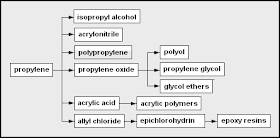The article linked below describes an industrial synthetic biology project to develop microbes which will produce propylene directly from renewable feedstocks. This type of substitution of biological products in place of crude oil -- once perfected -- will play a large part in extending the life of global oil reserves.
Global Bioenergies, an industrial biology company developing sustainable routes to light olefins (earlier post), has demonstrated a novel metabolic pathway enabling the direct conversion of renewable resources to propylene, one of the main building blocks of the petrochemical industry. Propylene, mainly used to manufacture polypropylene plastics for the packaging and the car industries, is the second largest petrochemical by volume and currently represents a market of $93 billion.
...The development required both novel enzymes and innovative metabolic pathways. Engineering more active enzymes and implementing these into microbial strains will occur over the next years and should lead to a process prototype, which will remain to be industrialized.
...Global Bioenergies is developing processes to convert renewable resources into hydrocarbons through fermentation. The Company initially focused its efforts on the production of isobutene, one of the most important petrochemical building blocks that can be converted into fuels, plastics, organic glass and elastomers. Global Bioenergies continues to improve the yield of its process and prepares the phase dedicated to pilot testing. The company is also looking to replicate this success with other members of the gaseous olefins family (propylene, ethylene, linear butylenes, butadiene…), key molecules at the heart of petrochemical industry. _GCC
Propene is the second most important starting product in the petrochemical industry after ethylene. It is the raw material for a wide variety of products. Manufacturers of the plastic polypropylene account for nearly two thirds of all demand. Polypropylene is, for example, needed for the production of films, packaging, caps and closures as well as for other applications. In the year 2008 the worldwide sales of propene reached a value of over 90 billion US dollars.[9]
Propene and benzene are converted to acetone and phenol via the cumene process. Propene is also used to produce isopropanol (propan-2-ol), acrylonitrile, propylene oxide (epoxypropane) and epichlorohydrin.[10] _Propylene (Propene) Wikipedia

No comments:
Post a Comment